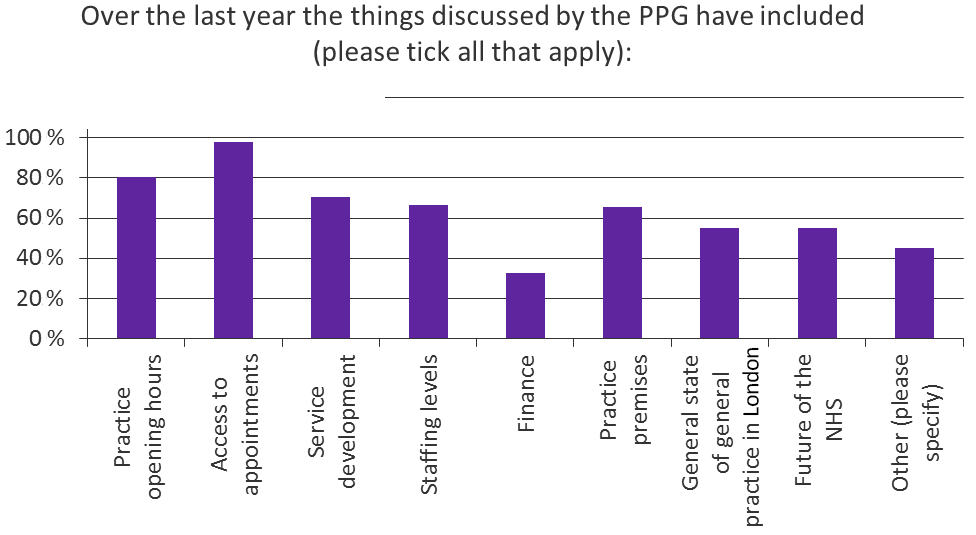Patient engagement survey 2016 - headline findings and key themes
Londonwide LMCs’ Patient Engagement Project started in July 2016. The project aims to support London GP practice teams in working collaboratively with their patients to shape high quality services and secure the future of their practices.
In August and September Londonwide LMCs conducted a patient engagement survey, offering practices the opportunity to help inform our Patient Engagement Project’s development and delivery by sharing their experiences of patient participation groups (PPGs). The survey went to practice leads (the member of staff at the practice responsible for patient engagement) and patient leads (the patient responsible for leading on patient engagement, normally the patient participation group chair). Survey responses illustrated the broad spectrum of practice and patient experience of PPGs across the capital.
- PPGs vary widely in size, in diversity of membership, in whether they meet face to face, virtually, or both.
- The majority of survey respondents reported that their PPG supported their practice and benefited patients, however some respondents were unsure of the impact of their PPG and some practice leads reported their experience of their PPG as entirely negative.
- Common characteristics of effective and active PPGs included an open culture of partnership working between practice and patients, aiming for PPGs inclusive of the diversity of local patient populations and ensuring clearly defined roles and expectations are owned and shared by both practices and patients.
Foundations to build on
Well established groups
- The majority of all survey respondents reported that their PPG had been operating for more than three years.
Increasing patient satisfaction
- 69% of patient lead respondents reported that the work of their PPG had made a positive difference to services received by patients at their practice.
- 60% of the practice lead respondents reported that their PPG positively influenced practice service delivery.
Mobilising patient support
- 59% of the practice lead respondents reported that patient participation was definitely supportive of their practice.
- The state of general practice in London and the future of the NHS were reported by the majority of survey respondents as being on the agenda of their PPG.

Barriers to overcome
Representation
- The main barrier to participation reported by all survey respondents was “lack of patient interest”.
- 45% of the practice lead respondents reported that their PPG was not representative of the demography and diversity of their practice patient population.
Roles and objectives
- 36% of patient lead respondents reported that they were not entirely sure of their role.
Connecting with the system and local partners
- 29% of practice lead respondents reported that they had some support from external agencies in developing their PPG.
Londonwide LMCs’ support
- Sharing survey findings and themes at Londonwide LMCs hosted meetings (e.g Practice Manager Leads Forum) and publications (e.g Londonwide LMCs’ newsletter).
- Delivering a series of workshops for practice leads and their patient leads on reviewing and clarifying the role and purpose of their PPGs; widening the reach and increasing the diversity of PPG membership; practices and PPGs acting together to influence local and Londonwide LMCs’ policy on general practice.
- Working with third sector patient and carer organisations to identify local, Londonwide LMCs and national resources available to support practices and patients in effectively developing their PPGs.
- Producing briefings and templates for practices and patients.
If you would like to know more about Londonwide LMCs’ patient engagement work please email patientengage@lmc.org.uk or sign-up your practice and patient leads to one of our patient engagement workshops.
Last updated : 25 Jan 2017
NWL LMC Update January 2022 (31 Jan 2022)
Islington LMC Newsletter - January 2022 (31 Jan 2022)
Please click here to read the latest Islington LMC news update.Tips of the month January 2022 (19 Jan 2022)
We provide weekly tips based on common queries which come through to us from London GPs and practice teams. These are shared via social media and collated for...Fuller report response (19 Jan 2022)
Professor Claire Fuller is leading a wide-ranging national stocktake of how best primary care can be supported within the emergent Integrated Care Systems (ICS). The focus of the work will be on...Online and video consultation data collection (19 Jan 2022)
A data provision notice (DPN) for a data collection on Online and Video Consultation in General Practices was issued to general practices in England on 10 January 2022. NHS...PANORAMIC study (19 Jan 2022)
Dr David Mummery is a member of Hammersmith and Fulham LMC and Clinical Speciality Lead for Primary Care, North West London Clinical Research Network. He writes here about why practice participation...General practice issues in Parliament (19 Jan 2022)
In December, the House of Commons’ Health and Social Care Committee published their report on clearing the backlog caused by the pandemic. Research by the Institute for Fiscal...Managing a remote team module - applications now open (19 Jan 2022)
Runs: online, with a taught day on 4 February 2022 Costs: £325 + VAT This module is suitable for anyone working in a position of management or leadership where members...December 2021 workforce survey results (19 Jan 2022)
Thank you for taking the time to complete our December 2021 workforce survey at time when practice teams were so overstretched. We had 327 responses from 277 individual member practices, of...Londonwide LMCs' January 2022 Newsletter (19 Jan 2022)
Guidance
We provide expert guidance for practices in our guidance section, as well as an archive of other materials you may find useful.
GP Support
Contact our GP Support team if you need help or advice.
The team provide professional and pastoral support to GPs and practice teams on a broad range of issues.

